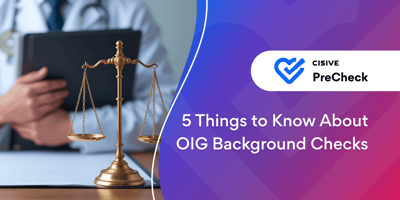

Hiring in healthcare carries a higher standard of responsibility than almost any other field. When...

Hiring for home-based care isn’t like staffing a hospital floor or an outpatient clinic. When a home health aide enters someone’s living room, you’re entrusting them with far more than clinical responsibilities. You’re placing them inside a vulnerable person’s private world. But the pressure to fill urgent staffing gaps can cause critical compliance steps, such as home health aide background checks, to slip through the cracks.
That’s when problems start. A missed red flag. An overlooked sanction. A rushed onboarding process that exposes patients, families, and your organization to avoidable risk. Even one oversight can result in regulatory fines, loss of licensure, or lasting reputational damage. For healthcare leaders managing high turnover and limited candidate pools, the stakes are high, and the margin for error is minuscule.
The good news is that with the right screening strategy, you don’t have to choose between speed and safety. A strong background check process for home health aides protects patients, supports faster onboarding, and reduces long-term liability. Building a safer, more resilient workforce starts with getting this one thing right.
Key TakeawaysHere are the key things you need to know about background checks for home health aides:
|
Home health aides serve on the front lines of patient care, often as the primary point of contact for individuals who are elderly, chronically ill, or recovering from surgery. Many of these patients live alone or have limited mobility, which places aides in a uniquely sensitive position of trust and responsibility. Unlike clinicians in hospital settings, home health workers operate without direct supervision. That independence makes thorough background check compliance critical.
A single lapse in screening can lead to devastating patient outcomes, from physical harm and theft to fraud or elder abuse. For healthcare organizations, the consequences include regulatory penalties, reputational damage, and the erosion of public trust. Background checks are one of the most effective tools for reducing these risks.
Ensure patient safety by screening for criminal records, abuse history, and disqualifying offenses.
Meet federal and state compliance requirements for Medicare-certified home health agencies.
Prevent costly penalties by avoiding hires from the OIG Exclusion List.
Reduce liability by maintaining consistent screening standards across employee types.
Build trust with families and referral partners through demonstrable due diligence.

A background check for home health aides involves much more than a basic criminal history search. Because these professionals provide hands-on care to vulnerable individuals, their screenings must be comprehensive, consistent, and compliant with state and federal regulations. Here are six components of a well-structured background check for healthcare professionals that ensure only qualified and trustworthy individuals represent your organization and enter patients’ homes.
Criminal background checks can identify past convictions that may disqualify a candidate from working in healthcare. These searches typically include national, state, and county-level databases, as well as sex offender registries and abuse or neglect listings. Employers look for offenses related to violence, theft, fraud, drug use, or elder abuse. They especially review for disqualifying offenses under state or federal criteria. Reviewing criminal history is essential for protecting patients and minimizing liability.
In many states, home health aides must hold a valid certification or license to provide services. License verification confirms those credentials' authenticity, status, and expiration date. It may also reveal disciplinary actions taken by licensing boards. Failing to verify licenses can be a compliance violation, especially in Medicaid or Medicare-certified agencies. Cisive offers professional license verification services that integrate with HR systems and ensure up-to-date tracking, helping healthcare employers maintain compliance with less administrative burden.
Many home health aides are required to drive between client homes, which makes motor vehicle record (MVR) checks a valuable part of the screening process. Reviewing driving history helps confirm that candidates are legally eligible and safe behind the wheel. These searches verify a candidate’s driver’s license status, identify suspensions or revocations, and flag moving violations or DUI convictions. Even when driving is not the aide’s primary duty, organizations that overlook MVR checks risk liability if an incident occurs during work-related travel.
Drug screening is another critical step for safeguarding patients and meeting healthcare compliance standards. Pre-employment drug tests typically check for substance use, including opioids, amphetamines, marijuana, cocaine, and other controlled substances that may impair judgment or performance. Sobriety is a non-negotiable safety issue for home health aides, who often work alone and may administer medications or assist with mobility.
Sex offender registry checks screen candidates against state and national registries to identify convictions involving sexual misconduct or abuse. This is especially critical in roles that involve close and often unsupervised contact with elderly or disabled individuals. These searches add a layer of protection for patients and help healthcare employers perform due diligence in hiring. A thorough check ensures that anyone with a known history of sexual offenses is flagged before they’re placed in a care setting.
In addition to criminal and registry checks, healthcare employers must screen candidates against federal exclusion lists, including the OIG’s List of Excluded Individuals/Entities. Hiring someone on this list, even unknowingly, can result in steep financial penalties and disqualification from federal healthcare programs. Cisive offers automated tools that simplify healthcare exclusion and sanction screening, helping providers maintain compliance without added administrative burden.

Even when a candidate looks strong on paper, background screening can uncover deeper issues that may disqualify them from working in a sensitive, unsupervised role. Home health aides are entrusted with intimate access to patients, many of whom are medically fragile or cognitively impaired. That level of trust demands more than basic qualifications. It requires a clear history of accountability and safety.
Screening can identify incidents or patterns of behavior that could jeopardize patient well-being, violate compliance, or expose your organization to undue risk. The following red flags are particularly critical when reviewing background check results.
Inconsistencies in work history, unexplained gaps in employment, or exaggerated credentials can be early signs of misrepresentation. These discrepancies can appear during employment verification, reference checks, or license validation. For example, employers should pause and investigate when a candidate claims to have experience in a skilled nursing facility but the license board shows no active certification record. Verify every detail through trusted sources, especially those related to credentials or direct patient care.
A non-negative or confirmed positive drug test result must be reviewed in the context of your organization’s drug-testing policy and applicable state or federal regulations. Typically, the candidate is informed and given an opportunity to provide a legitimate medical explanation. Upheld results can disqualify the applicant, particularly for roles involving medication handling, transportation, or unsupervised patient interaction. Consistency in documentation and policy application is essential for compliance and fairness.
Convictions for offenses such as elder abuse, domestic violence, sexual misconduct, theft, or drug-related charges are serious concerns in home care settings. Depending on your state’s disqualifying offense list, these convictions may legally prevent the individual from working in a direct care role. When such findings appear, consult your internal risk and compliance policies to determine eligibility and next steps. In many cases, further investigation or documentation may be required to assess whether the conviction is disqualifying or if the candidate is eligible for consideration under rehabilitation guidelines.
Risk doesn’t stop after making a hire. Home healthcare aides work independently with vulnerable patients, which means new criminal charges, lapsed licenses, or changes in federal exclusion lists can create serious liabilities if they go unnoticed. A one-time background check won’t catch changes that happen months or years into employment.
Ongoing monitoring keeps your organization ahead of these risks. It provides real-time alerts for events like criminal convictions, license expirations, and sanctions. One of the most critical areas is exclusion screening. The Office of Inspector General (OIG) maintains a federal list of individuals barred from participating in Medicare and Medicaid programs. Employing someone on that list, even unknowingly, can lead to steep fines and program disqualification.
Cisive’s healthcare exclusion and sanction screening automates this process by continuously monitoring OIG, SAM.gov, and state Medicaid lists. Instead of relying on manual audits, your team gets proactive protection with less administrative lift — keeping patients safer and your compliance intact.
Hiring home health aides requires employers to navigate a patchwork of state regulations, federal compliance standards, credential verification steps, and time-sensitive onboarding demands. A background check service takes this complex, high-risk process and makes it manageable, consistent, and compliant. Providers can focus on delivering care, not chasing down paperwork.
PreCheck, a Cisive company, specializes in healthcare-specific background screening and credentialing. With tools built to verify licenses, monitor exclusion lists, track drug testing, and integrate into onboarding workflows, PreCheck helps home health agencies hire quickly without compromising safety. Automated alerts, real-time data, and healthcare-grade compliance support mean you can meet staffing goals while protecting your patients and your organization.
Hiring the right home health aides requires precision, compliance, and a commitment to patient safety. From criminal background checks and license verification to ongoing OIG exclusion monitoring, every step is important for protecting vulnerable populations and maintaining regulatory integrity. If you're ready to build a safer, more efficient workforce with home health aide background checks, connect with a Cisive pro and learn how PreCheck can help streamline your background check program from day one.
Author: Brent Gibbons
Bio: Healthcare Screening Expert at Cisive PreCheck.
Let's Connect on LinkedIn
Hiring in healthcare carries a higher standard of responsibility than almost any other field. When...

As a Medical Staff Professional, you know how important it is to vet providers thoroughly. After...

Between finding the right candidates and navigating complex regulations, hiring in the healthcare...